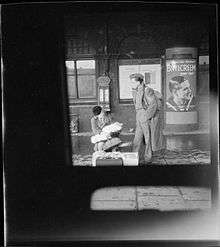Brylcreem
 | |
| Launch year | 1928 |
|---|---|
| Company | County Chemicals, Birmingham, England. |
| Availability | Worldwide |
| Current supplier |
Combe Incorporated Unilever HUL |
| Website | official website |
Brylcreem /ˈbrɪlkriːm/ is a British brand of hair styling products for men. The first Brylcreem product was a pomade created in 1928 by County Chemicals at the Chemico Works in Bradford Street, Birmingham, England. The pomade is an emulsion of water and mineral oil stabilised with beeswax.
Ownership
The British pharmaceutical firm Beecham was the longtime owner of Brylcreem. Sara Lee bought the personal care unit of SmithKline Beecham in 1992. In 2012, the global rights to sell Brylcreem brand was sold by Sara Lee Corporation to Unilever.
Various Brylcreem products are sold worldwide. Brylcreem is marketed in the US by Combe Incorporated, in Europe by Unilever and in India by HUL. Before Godrej acquired 51 per cent stake of Sara Lee in their joint venture Godrej Sara Lee in 2010, the brand was distributed by Godrej in India.
Jingle
It was first advertised on television with the jingle "Brylcreem — A Little Dab'll Do Ya! Brylcreem — You'll look so debonaire. Brylcreem — The gals'll all pursue ya; they’ll love to run their fingers through your hair!."[1]
The Brylcreem TV advertisement included a cartoon animation of a man with initially tousled hair who happily has a little dab applied, and, miraculously, the hair combs and smooths itself.
When the dry look became popular, partly inspired by the unoiled moptops of the Beatles, the last line was changed from "They'll love to run their fingers through your hair", to "They'll love the natural look it gives your hair."
Subsequent television advertisements used the mottoes "Grooms without gumming" and later, in the 1970s in the UK and Canada, "A little dab of Brylcreem on your hair gives you the Brylcreem bounce".
Notable users and popular culture

- Ronald Reagan, the 40th President of the United States, used Brylcreem.
- Royal Air Force personnel, especially pilots, were nicknamed 'Brylcreem Boys' because of their conspicuous use of the hair cream.
- The Brylcreem Boys is a 1998 film directed and co-written by Terence Ryan about the internment of Axis and Allied combatants during World War II
- Brylcreem is referenced in the song "Pencil Thin Mustache" by Jimmy Buffett.
- Tony Gibson - "conscientious objector who became the smooth image of the RAF", Donald Rooum and Rufus Segar[2]
- In The Rutles' All You Need Is Cash (1978), a Beatles mockumentary, mentions that one of its characters shortened his hair "to save on Brylcreem."
- In One Flew Over the Cuckoo's Nest, while a nurse is applying conductant during electroshock therapy, McMurphy quips: "A little dab'll do ya."
- In Seinfeld (Season 5, Episode 11), George Costanza explains how he still has Brylcreem despite the fact that he is bald.
- In Louie (Season 3, Episode 11), David Lynch's character explains to Louis CK that he needs some Brylcreem along with a new suit to look the part of a late show host.
- In Law & Order (Season 12, Episode 20), Lennie Briscoe remarked, "A little jab'll do ya," a play on the well-known tagline with reference to a death facilitated by the drug midazolam.
- In The Sopranos (Season 2, Episode 3), Junior Soprano remarks to Richie Aprile "The Federal Marshals are so far up my ass I can taste Brylcreem."
- In King & Maxwell (Season 1, Episode 3), Sean King says about FBI offices "It smells like Brylcreem."
- In American Dad! (Season 1, Episode 9, "A Smith In The Hand") has the title character searching for ointment and in desperation crying 'A little dab'll do ya!'
- In an episode of The Colbert Report, Stephen Colbert calls Ted Cruz "Texas senator, and Brylcreem storage facility, Ted Cruz."
- In Mad Men (Season 1, Episode 7), Roger Sterling orders more drinks before a meeting with the Nixon campaign declaring "Well, what the hell? It's the GOP. They'll never smell it over the stench of the Brylcreem."
- In Call the Midwife (Series 3: Ep. 1 "Christmas Special"), Dr. Turner's son, Timothy, asks for a jar of Brylcreem while imprisoned in an iron lung upon a Polio diagnosis." (Series 5: Ep. 7), Tom and Barbara are getting frisky against a wall in Nonnatus and gets the Brylcreem from his hair stuck on it.
- In Sunset Overdrive there is a character named Bryllcreem who helps the player.
- In Kath & Kim, Kel uses brylcreem in every episode.
- The Hilltop Hoods refer to Barry's Brylcreem in their song 1955.
- In 2016, Brylcreem is now in India launched on Sidharth Malhotra, has also Bollywood actor as our new brand ambassador.
See also
References
- ↑ Del Ponte, Jimmy, "And now a word from our sponsor," The Somerville Times, Somerville, Massachusetts, 27 August 2011. Retrieved 18 September, 2014
- ↑ The Guardian, 30 April 2001.
External links
- Brylcreem UK
- Brylcreem USA
- Brylcreem schoolboy meets hero Beckham to form dream team
- Birmingham's industrial history site
- Tony Gibson obituary, The Guardian.
- World War 2 adverts